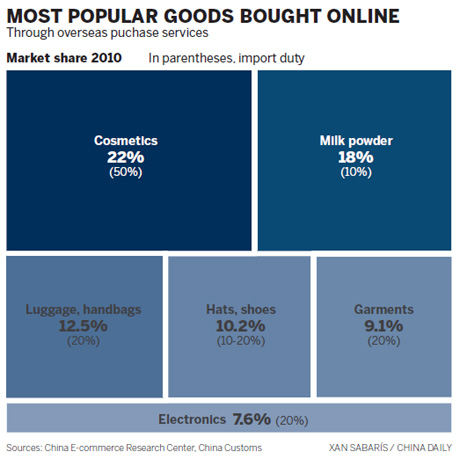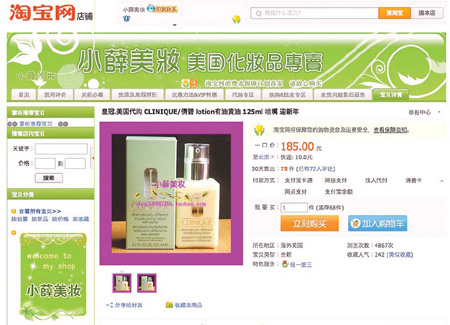Economy
Overseas online purchasing comes into fashion
By Gao Qihui (China Daily)
Updated: 2011-02-25 12:57
 |
Large Medium Small |

Agents feel it
The selling price set by overseas purchasing agents usually includes the original purchase price in the overseas market, local excise tax there, freight costs, the import tariff and a service charge, said usashopcn.com's Shi.
The new import duty on mailed items gives three choices to purchasing agents: Raise prices on the high-duty items, spread that extra cost over a wider array of items, or take a loss.
|
||||
Li, who started her business in September 2009, thinks it will be more difficult for her to continue the service due to fierce competition and what she considers an unfavorable import duty.
The advantage goes to agents with big overseas purchasing services.
Whether the agents have a stable supply of goods and buy the goods at lower prices are key elements in the industry, said Su Huiyan, an analyst with Shanghai-based iResearch. The big agents can buy directly from the brand owners, Su said, but small ones can buy only from dealers or even the supermarket - at higher prices.
And agents who deal with a wide variety of goods can adjust the prices in some categories to make up for lower profit in others, or can shift their business to product lines that are less affected by the higher duties. Agents with small operations often don't have those options.
Su also said that the new customs regulation won't affect the large, professional overseas purchasing companies because they generally have declared imported products at customs all along.
But customers still come out ahead. Even with the import duty included, the ultimate price of most products bought from overseas is still lower than the price in domestic franchised stores, CERC said it in its report. The domestic price is higher now because it includes the import tariff, too.
Wu Ning, an individual agent who has purchased products from Hong Kong for more than a year, said, "As long as the tax imposed by the customs stays at this level, the demand for overseas purchasing services will not decline."
Change in the market
It will, however, lead to a shuffling in the market, said CERC analyst Fang. And CERC's report said that will mean an improvement over time, because it will eliminate small agents who cannot guarantee product quality or provide service after the sale.
Some foreign brand owners are moving to e-commerce on the Chinese mainland to cut the cost of distribution, said Wang Rulin, the standing deputy director of the Committee of Experts on Mobile Commerce at China E-Commerce Association.
These international brands are looking to cooperate with Chinese websites so they can hand over the sales process to websites that can directly sell products to consumers without the involvement of dealers. Nokia and Motorola are already working with EC3S, an e-commerce provider that runs a commercial website for mobile phones.
"That will save a considerable expense on rent and management of a storefront and can provide for home-delivery service," Wang said.
As the websites gain support from the foreign brand owners, the quality and maintenance of products sold by these agent websites can be guaranteed, Wang said.
|
 |
|
A screenshot of an overseas purchasing service shop on taobao.com. Cosmetics were the most popular category of products bought through such services in 2010. |
| 分享按钮 |


